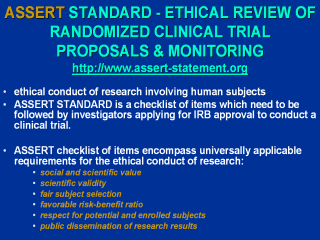| front |1 |2 |3 |4 |5 |6 |7 |8 |9 |10 |11 |12 |13 |14 |15 |16 |17 |18 |19 |20 |21 |22 |23 |24 |25 |26 |27 |28 |29 |30 |31 |32 |33 |34 |35 |36 |37 |38 |39 |40 |41 |42 |43 |44 |45 |46 |47 |48 |49 |50 |51 |52 |53 |54 |55|56 |57 |review |
 |
The conduct of clinical trials
Each year thousands of randomized controlled clinical trials are performed worldwide. These typically involve marketed drugs or investigational agents, with the control arm involving an active agent or placebo. Other medical interventions may also be evaluated, such as surgical procedures and radiation therapy. Trials may be sponsored by a variety of institutional or public agencies, a pharmaceutical company seeking regulatory approval for a new drug, or conducting a formal efficacy comparison of an approved drug with another commonly used agent. Randomized controlled trials are recognized as providing the highest quality of evidence to guide clinical practice (1), and to demonstrate relative efficacy to drug approval agencies in the case of investigational agents (2). The results of multiple trials may be aggregated and analyzed in the context of systematic reviews and meta-analyses of the published literature (3,4). Such reviews and analyses may also be used by agencies that make decisions concerning health-care expenditures, or consumers in the context of personal health-care decisions (5). Thus, the results of clinical trials are of considerable importance in many interrelated health-care contexts. In 2000, Emanuel and colleagues (8) enumerated seven universally applicable requirements for the ethical conduct of clinical research, all of which are included, explicitly or implicitly, in national and international regulations or codes of conduct: social and scientific value; scientific validity; fair subject selection; favorable risk-benefit ratio; independent review; informed consent; and respect for potential and current research subjects. These requirements are ordered chronologically from the design and inception of the protocol through the monitoring of ongoing research activities. Thus, a trial concept that is not scientifically or medically relevant, or a trial design that is not scientifically valid, renders the research proposal ethically illicit, irrespective of the extent to which the other requirements are met. Although specific principles enumerated in international codes, such as the Declaration of Helsinki, are alluded to herein, the ASSERT checklist items represent a practical expression of five of these requirements in the context of a review of proposed clinical trials. |